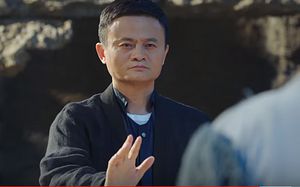In Chinese, single people are called “bare branches” (guang gun). That may be why November 11, or 11/11 written numerically — which looks like four “bare branches” — has been designated as Singles’ Day by some Chinese young adults, and the celebration of the day has become increasingly popular nationwide since the 2000s.
Since the early 2010s, China’s e-commerce giant Alibaba Group has single-handedly turned Singles’ Day into the biggest shopping event by launching large-scale shopping promotions centered around November 11. Gradually, other e-commerce companies also joined the event and Singles’ Day no longer belonged to single people only, but to all e-consumers across the nation, just like Black Friday in the United States.
On November 12, Alibaba announced that it generated a record 168.2 billion yuan ($25.3 billion) in sales during 24 hours on Singles’ Day, an increase of 39 percent compared to 2016. More than 140,000 brands and merchants doing business on Alibaba’s online platforms participated the promotion event.
In an attempt to display Chinese consumers’ contribution to the global economy and China’s robust consuming power, Alibaba particularly released the data involving international merchants. The company claimed that as many as 60,000 international brands and merchants had joined the promotion event. Of those, 167 merchants each generated more than 100 million yuan ($15.1 million) in sales, 17 surpassed 500 million yuan ($75.4 million), and six merchants surpassed 1 billion ($150.9 million).
However, there are serious problems looming behind the boom in consumption.
In the name of reducing its foreign trade surplus to encourage balanced trade growth, the Chinese government launched a policy of stimulating domestic demand in 2011 under the administration of Hu Jintao and Wen Jiabao. Since then, “buy buy buy” has become a catchphrase nationwide and consumerism a new national religion.
The fast development of e-commerce, online payments, and express shipping services in China has made online purchasing extremely convenient: with a simple click on one’s smartphone or computer, a customer can buy whatever he wants instantly. But the convenience has also spurred irrational purchasing decisions, particularly on Singles’ Day. Some Chinese netizens even made jokes about “chopping one’s hands off” as a cure for addiction to purchasing online; many Chinese news media outlets and even some local governments had to issue special notices about “rational consumption” ahead of Singles’ Day.
Meanwhile, the worship of money has become widespread. Ma Yun (or Jack Ma), the founder of Alibaba as well as Asia’s richest man, has become the idol of countless Chinese nationals. To show their absolute adoration of Ma, some netizens even address him as “daddy,” though in a half-joking way.
Ma himself is also fully aware of his power of wealth. To realize his personal dream of becoming a kung fu star as well as to stimulate the frenzy of Singles’ Day, Ma made a movie and starred as a kung fu master. Almost all the famous martial arts actors in China, like Jet Li and Donnie Yen, played supporting roles in the film. In addition, Ma recorded a duet as a theme song for the movie with one of the most prominent Chinese singers, Faye Wong — another personal dream realized by Ma.
The movie and the theme song have stunned the Chinese pop world. Thousands of Chinese netizens commented that “in China, as long as one has money, he can do whatever he wants.”

































